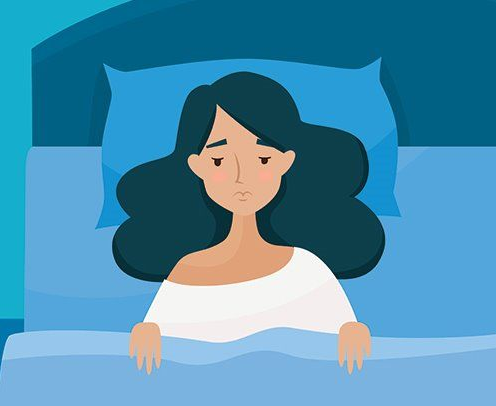By: Claire Leibowitz, Lifestyle Editor-in-Chief
Sleep is always the first thing cut from an overbooked schedule – it’s seen as dispensable. Why has this become normalized?
A lack of sleep has extreme consequences on the body, both immediate and long term. It’s more productive to straighten out a sleep schedule than stay up finishing an assignment into the middle of the night.
The Sleep Doctor states that chronic stress disrupts the body’s internal clock that distinguishes sleep and wake time. People who experience stress during the day have a harder time falling asleep at night due to increased cortisol levels. Stress also has a negative effect on dreams, and decreases rapid eye movement (REM) sleep, which is important for mental and physical health.
The sleep-stress cycle is an intricately woven system between the roots of stress and the concept of sleep. The American Psychological Association explains that when people are stressed, they sleep less. When people sleep less, they stress more about their sleeping habits. These negative perceptions feed into each other, further exacerbating the issue.
Getting a good night’s sleep, according to the APA, provides the body with many benefits, like muscle repair and memory consolidation. Sleep deprivation, on the other hand, has negative impacts on memory, judgment, and mood.
Getting less sleep inhibits factors that would otherwise lead to the development of positive study and work habits. Optalert found that a lack of sleep leads to forgetfulness and causes many to become more easily distracted, making it harder to remember, retain, and recall information. Everyday functions like work, exercising, and cooking become sloppy and reaction times become slower.
Also according to Optalert, people with consistently bad sleeping habits have reaction times equivalent to those with a BAC of 0.05 after drinking. This can lead to poor decision-making and a decreased tolerance for other people. Overall, when people sleep less, they become more irritable and lose motivation. This contributes to a pattern of stress, anger, sadness, and mental drain.
A reduced quality of life and physical pain also result from less sleep, according to a Dovepres study. Psychosocial health, which includes mental, emotional, social, and spiritual health, decreases when sleep decreases too. When psychosocial health factors don’t improve mental health and reduce stress, sleep is negatively impacted. This further plays into the sleep-stress cycle.
The Cleveland Clinic emphasizes the long term effects of poor sleep patterns, which include high blood pressure, diabetes, cardiovascular diseases, obesity, depression, reduced immune system function, and a lower sex drive.
Additionally, sleep cannot be “made up for” on the weekends. It’s not sustainable to get less than seven hours of sleep during the week, even if you get over 12 hours on the weekends. The only way to have a positive sleep schedule is to consistently get in between 7-9 hours every night.
Breaking bad sleep habits is hard. The first step is to not look at the clock before going to bed or when waking up in the middle of the night. The act of counting out the maximum hours of sleep you’ll receive if you fall asleep right at that moment adds stress and pressure to the sleep process.
Instead, consistency when going to bed and waking up is key. Activity and exercise during the day can also tire the body out and encourage better rest. Sleep should be a priority. Getting ready for bed should also be a priority and incorporating a relaxing nighttime routine could actually improve sleep as well. Whether it’s reading, drinking a cup of tea, doing a skincare routine, or meditating, the activity doesn’t matter as long as it doesn’t include a phone, tablet, or computer.
It’s essential to associate bed with sleep only – take homework, phone calls, and other tasks to another space. Schedule time out of your day to focus on stress, such as through journaling or talking about stressors and important upcoming tasks. This helps prevent the feelings from coming up before bed or in the middle of the night.
Reducing stress throughout the day can help too. Taking on hobbies and new interests, exercising, meditating, and connecting with friends and family can eliminate stress and therefore improve sleep.
So, the next time you’re stuck between spending the night in Gelman or spending the night asleep with a point deduction for lateness, take the deduction. Sacrificing sleep is not temporary; its long term effects will impact your body, brain, and overall mental health.

